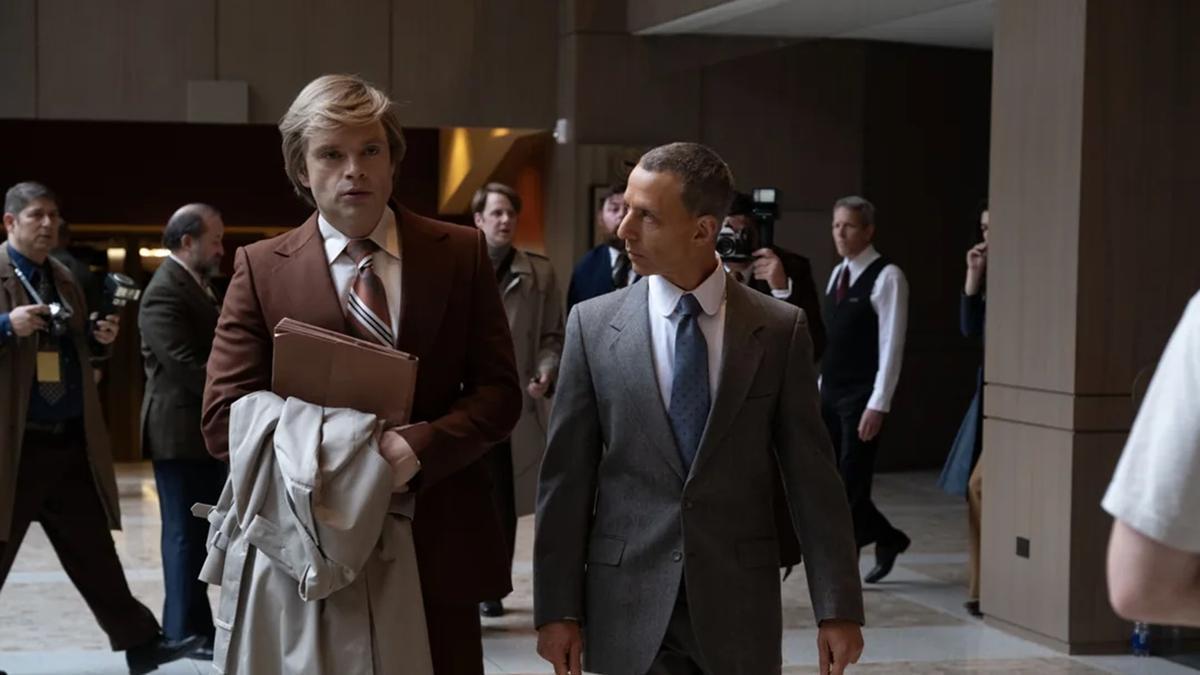
Ali Abbasi’s latest cinematic offering, “The Apprentice,” is a deep and unsettling exploration of the early years of Donald Trump’s meteoric rise from a bold and self-serving real estate heir to the controversial figure whose persona has become a fixture in global politics. While mainstream media has been saturated with tales of his exploits, controversies, and scandals for years, Abbasi attempts to peel back the layers and present an unorthodox narrative. The film is not merely an exposé on Trump, but an introspection of the insidious nature of power, how it corrupts, and how aspiration can morph into moral corruption given the right—or wrong—influences.
Sebastian Stan takes on the formidable role of young Donald Trump before he became synonymous with flamboyant public appearances and social media outbursts. His portrayal is both a spectacle and an unsettling study in precision. Through exaggerated expressions, notably his distinct pouting, gesticulations, and that familiar vacant smirk, Stan embodiment of Trump during this pivotal period feels almost eerily precise. However, it’s not just the surface-level mimicry that impresses; it’s his ability to humanize Trump’s emotional development. Stan delves into the psyche of a man who hasn’t quite identified his own identity but is certain he’s willing to forego any principle to transform into someone significant. This evolution, in retrospect, is chilling as it foreshadows the looming specter that would later dominate America’s political theater.
Central to this narrative is Trump’s mentor-like relationship with Roy Cohn, the notorious lawyer remembered for his influential but morally ambiguous legal career, including his role in the execution of the Rosenbergs. Jeremy Strong’s performance as Cohn is mesmerizingly sinister, channeling a level of cynicism and serpent-like cunning reminiscent of his portrayal of media tycoon dynasty’s Waystar Royco. Riveting and malignant, Cohn stalks the film’s backdrop, constructing the foundation upon which Trump’s later actions are premised. Cohn’s worldview, poisoned by his own prejudices and driven by a ruthlessly Machiavellian ethos, sees in Trump a malleable protégé: a person eager to wield unethical means and unscrupulous practices for personal gain while being easily shaped by those more cunning.
Beneath the political subtext and maneuvering that characterize their interactions lies an unforeseen dimension: a rapport that simmers with a bizarre, unwholesome intimacy masquerading as a student-mentor dynamic. Abbasi illustrates this connection not merely as tactical plotting but as a bond encapsulated by mutual, albeit reprehensible, admiration. Their shared ideological descent is etched through scenes of whispered strategies and shared understandings—a fraternity more akin to depravity than genuine kinship.
This eerie brotherhood imbued with subtextual intimacies adds a layer of discomfort, hinting at a Faustian narrative before ultimate comprehension of the proverbial deal is reached. The nuanced staging of their dynamic evokes an atmosphere of foreboding, with an undercurrent of implicit tensions that make viewers’ skin crawl—imbuing the duo’s exchanges with an unsettling allure.
.
“The Apprentice” is carried by the strength of its two lead performances, each actor bringing their A-game to their respective portraits. Strong’s striking reflection of Cohn is a blend of suave assertion and iciness, unapologetically peeling back the facade to reveal a bed of hidden resentment. Scenes depicting him as he manipulates judicial figures, instructs Trump in the art of deflection through intimidation, and recklessly dismantles lives have an air of foresight. Stan, on his part, accomplishes an incredible transition, endearing Trump’s initial fumblings with an aura of almost sympathy—until the familiar flicker of self-advantageous malevolence in his eye interrupts the illusion.
Abbasi’s direction, known for its starkness as seen in “Holy Spider,” overshadows the narrative with a pervasive sense of dread. New York City in the 1970s becomes an apt metaphor—a city fraught with decay yet dazzlingly opportunistic. Cinematographer Kasper Tuxen beautifully juxtaposes scenes of the city’s tarnish and luminescence, encapsulating a world of possibility fertile for those ready to exploit it.
The script, while intense and dramatic, also injects a dash of dark humor. It captures moments of absurd, almost grotesque comedy—like when Trump meticulously frets over his hairstyle or Cohn’s condescending sartorial advice—heightening the surreal ambiance. Yet, the humor is a setup, and at crucial moments, Abbasi deftly pulls the rug to reveal the harsher truths beneath the laughter.
Where the movie stumbles at times is in its latter parts, where it is tempted towards the more sensational moments drawn from headlines. A depiction of a much-publicized instance of domestic turmoil involving Trump and his first wife, Ivana, is notably discordant. It distracts from the intricate psychological scaffolding that Abbasi painstakingly constructs in earlier moments.
Despite these stumbles, “The Apprentice” transcends being just another portrait of a controversial figure. It is a cinematic reflection on myth-making—the construction of the influential public persona of Trump as an unerring victor, a narrative about flaws and the nature of perceived success. Abbasi persistently reminds audiences that while Trump’s real downfall was never truly witnessed, his ascent was supervised collectively. The film, propelled by Stan and Strong’s commanding performances, paints a lasting image of the American saga turned into a cautionary narrative, demanding not to be overlooked.
Expected to debut in theaters today, the theatrical release of “The Apprentice” in India experienced postponements following a revelatory uncut premiere just last evening.












